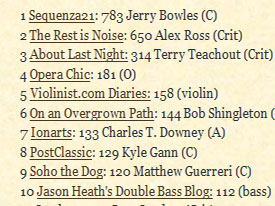 The past few months have seemed depressingly full of deaths, including some of the grand figures of our time. But sadder still is when we lose a wonderful musical voice far too soon. I just learned over at NewMusicBox that the highly talented composer and pianist Jennifer Fitzgerald lost her life to cancer just a few days before Christmas. Only 32 years old, but already crafting some really beautiful, exciting music… One of the strange artifacts of the Internet age is that a person can leave and yet appear to be around through their webpages, busy and happy, like nothing at all had happened yet. Jennifer’s own website still has news of the recent NYC performance of her opera-in-progress, Judgement of Paris, and her composition list includes a number of pieces that were in the works. Both from her official site, as well as her Myspace page, you can hear excerpts of her music, that show all kinds of command and promise of even more good to come. I never met Jennifer; but through her music I’ll never forget her, either.
The past few months have seemed depressingly full of deaths, including some of the grand figures of our time. But sadder still is when we lose a wonderful musical voice far too soon. I just learned over at NewMusicBox that the highly talented composer and pianist Jennifer Fitzgerald lost her life to cancer just a few days before Christmas. Only 32 years old, but already crafting some really beautiful, exciting music… One of the strange artifacts of the Internet age is that a person can leave and yet appear to be around through their webpages, busy and happy, like nothing at all had happened yet. Jennifer’s own website still has news of the recent NYC performance of her opera-in-progress, Judgement of Paris, and her composition list includes a number of pieces that were in the works. Both from her official site, as well as her Myspace page, you can hear excerpts of her music, that show all kinds of command and promise of even more good to come. I never met Jennifer; but through her music I’ll never forget her, either.
The music year in Los Angeles is getting off to a good start with an exciting mini-festival by the L.A. Phil, led by David Robertson. What’s even nicer is that the Phil has given Sequenza21 readers a chance to win two tickets to next Friday’s concert, January 11, the program that appropriately includes “Sequenza X”. The contest ends tomorrow night, so enter now!
First, let me tantalize you just a little with some details of the series. Next week there will be the premiere of a new Michael Gordon work with Bill Morrison, “Dystopia”, with the Boulez “Explosante-Fixe” as the prelude. The series opens with Copland’s “The City” with film; the Varese “Ameriques” is on the program with works by Zappa and Crumb. The second program, which you readers have a chance to win tickets, opens with the Berio, followed by the Ives “Central Park”, and then works by Feldman, Benjamin and Zimmermann. There are two concerts, by visiting groups, of city songs and of electronic music. The festival includes three films with discussions at ArcLight (“Metropolis”, “Taxi Driver”, and “A Clockwork Orange”). And there will be a seminar. Click this link to read the program.
And do enter to win the tickets to the concert at WDCH on Friday, January 11. Just follow this link.
 Renewable Music‘s long-time American-in-Deutschland, Daniel J. Wolf, had the idea of inviting composers to contribute to an album for piano, simply centered around this moment and season. No publishers, no glitzy “call for works”, just a friendly invitation for any interested. The result is the A Winter Album, twelve piano pieces of quite diverse hues, for each and everyone of us to freely peruse in our gray and inclement hours. The composers may not be known to you, but all the better; they’re a stellar bunch in my book: Dennis Báthory-Kitsz, Jon Brenner, Steed Cowart, Elaine Fine, Hauke Harder, Ben.Harper, Jeff Harrington, Aaron Hynds, Lloyd Rodgers, Jonathan Segel, Charles Shere, and Daniel James Wolf himself. Pianists, warm yourself over these embers; and thanks, Daniel. (photo by Ian Britton)
Renewable Music‘s long-time American-in-Deutschland, Daniel J. Wolf, had the idea of inviting composers to contribute to an album for piano, simply centered around this moment and season. No publishers, no glitzy “call for works”, just a friendly invitation for any interested. The result is the A Winter Album, twelve piano pieces of quite diverse hues, for each and everyone of us to freely peruse in our gray and inclement hours. The composers may not be known to you, but all the better; they’re a stellar bunch in my book: Dennis Báthory-Kitsz, Jon Brenner, Steed Cowart, Elaine Fine, Hauke Harder, Ben.Harper, Jeff Harrington, Aaron Hynds, Lloyd Rodgers, Jonathan Segel, Charles Shere, and Daniel James Wolf himself. Pianists, warm yourself over these embers; and thanks, Daniel. (photo by Ian Britton)
One of our greatest musical thinkers in these last fifty years, Leonard B. Meyer has passed away. His series of books from 1956 onwards are still avidly bought, read and discussed in 2007, and that’s no mean feat. Some of his work was pioneering, some spookily prescient, and a lot of it has stuck in this head since my earliest college days. Thanks for all the fish, Leonard.
And you thought the only ones who needed to worry were the illegal file-sharers? After reading this article, think again:
…in an unusual case in which an Arizona recipient of an RIAA letter has fought back in court rather than write a check to avoid hefty legal fees, the industry is taking its argument against music sharing one step further: In legal documents in its federal case against Jeffrey Howell, a Scottsdale, Ariz., man who kept a collection of about 2,000 music recordings on his personal computer, the industry maintains that it is illegal for someone who has legally purchased a CD to transfer that music into his computer.
The industry’s lawyer in the case, Ira Schwartz, argues in a brief filed earlier this month that the MP3 files Howell made on his computer from legally bought CDs are “unauthorized copies” of copyrighted recordings.
“I couldn’t believe it when I read that,” says Ray Beckerman, a New York lawyer who represents six clients who have been sued by the RIAA. “The basic principle in the law is that you have to distribute actual physical copies to be guilty of violating copyright. But recently, the industry has been going around saying that even a personal copy on your computer is a violation.”
Last week, Democrats gave up their fight to block $70 billion in unrestricted war funding and on December 19, Congress sent the $556 billion omnibus spending bill to President Bush, who is expected to sign it.
Included in this bill is a historic increase in funding for the National Endowment for the Arts. Funding for the NEA will be increased by $20.144 million, or about 16%, to $144.706 million for FY08. This is less than the $160 million appropriation proposed in the House version of the bill, but more than the Senate proposal of $133.412 million and more than the President’s requested $128.412 million, and it represents the largest increase in NEA funding since 1979, when funding was increased by $25.735 million (which itself followed an increase of $23.978 million in 1978). The $144.706 million was actually $147 million before an across-the-board cut of 1.56%. NEA funding still has not recovered from the massive $62.8 million cut to the 1996 budget, but has increased every year starting with the 2001 appropriations.
Within the NEA appropriation, the biggest funding increase is to the “American Masterpieces” initiative, which the NEA website says “is a major initiative to acquaint Americans with the best of their cultural and artistic legacy. Through American Masterpieces, the National Endowment for the Arts sponsors performances, exhibitions, tours, and educational programs across different art forms that reach large and small communities in all 50 states.” The 2007 budget for this program was $5.911 million and it stands to nearly double to $13.289 million in 2008.
The League of American Orchestras is reporting that “Congressional Arts Caucus co-chairs Louise Slaughter (D-NY) and Chris Shays (R-CT) rallied House colleagues in support of the NEA, and Interior Appropriations Committee Chairman Norm Dicks (D-WA) championed NEA funding as a priority issue.” Special thanks to LAO’s Heather Noonan for help in finding the details of the bill, which you can see here and here.
National Endowment for the Humanities funding will increase by just $3.602 million, in spite of an $18.895 million request in the House version of the bill.
I missed this little diatribe from Bernard Holland in the Times. Thanks to Carmen Tellez for bringing it to my attention:
Unpleasant truths were another topic brought back forcefully by a concert at the Kitchen in September, by the fine young group Either/Or. Here was a program of 1960s arrogance and self-absorption, with people like Cornelius Cardew, Christian Wolff and Earle Brown as the main offenders. Listening to a collection of composers sharing inside jokes and private messages in music that reeked of contempt for the public made me get down on my knees and give thanks that an era so damaging to music was over. It didn’t drive an intelligent public away from classical music by itself, but it helped.
What’s Christmas without a little organ music? Der Engel by our own Steve Layton.
 Thanks, Scott. And a special thanks to all of you who come around faithfully to contribute the entertaining thoughts and comments that make this the liveliest venue for new music conversation on the web. I love you all, even the cranky ones.
Thanks, Scott. And a special thanks to all of you who come around faithfully to contribute the entertaining thoughts and comments that make this the liveliest venue for new music conversation on the web. I love you all, even the cranky ones.
Note: Christian Carey’s File Under? posts now have their own page.
